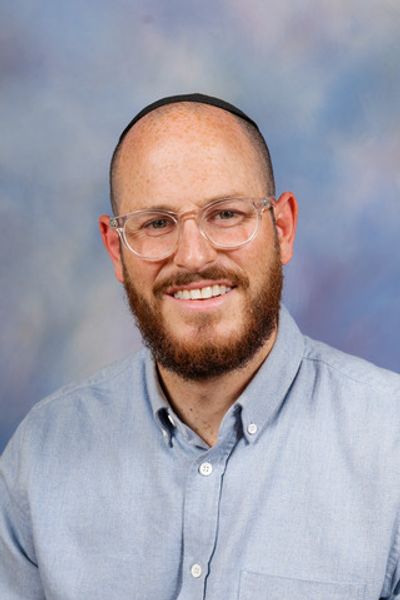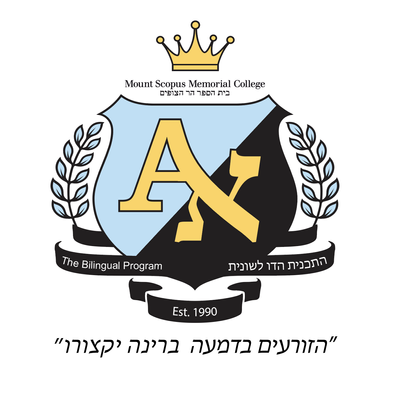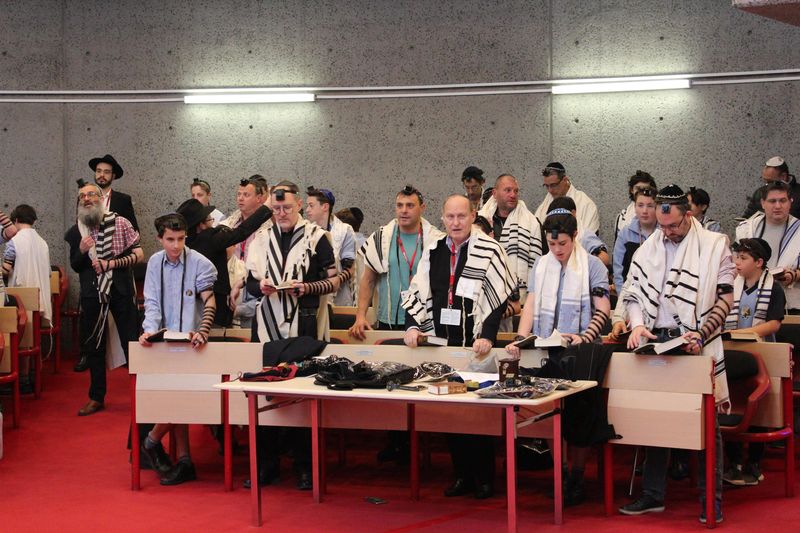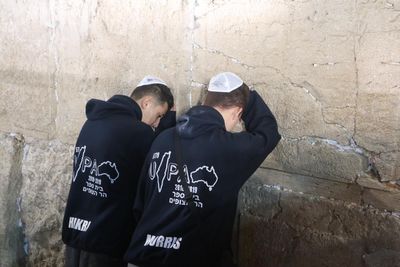Jewish Life and Learning
...provides Jewish learning, values and experiences, within a Modern Orthodox and Zionist framework, that enable each student to make an informed choice as to the meaning of their Jewish identity ...
— Mount Scopus Memorial College Mission Statement

Director, Alter Family School of
Jewish Studies and Ivrit
The fundamental reason for Mount Scopus' establishment is to provide our students with a well-rounded Jewish education. We focus on engaging students to become involved and to take ownership of their Jewish identity and the ways in which they connect to it. The opportunities are provided, both inside and outside of the classroom for all students, from our two year old Little Learners, to our graduating VCE students.
To hear from Matti Borowski on the importance of choice for students in their engagement in Jewish life at Scopus, click here.
The Alter Family School of Jewish Studies and Ivrit coordinates the delivery of the curriculum across the College, which includes engaging enrichment opportunities.
The Co-Curricular Jewish Education (CCJE) teams, across the primary and secondary campuses, bring the learning to life, with extra-curricular events and activities, ranging from model sedarim, to Master Talmud classes, to Shabbatonim to Zionist camps. There is always something happening, inside the classroom, and out, before, during and after school hours.
Various elements of Jewish life at the College are outlined below.
The study of Hebrew is mandatory until the end of Year 10. Beginner and support classes are available for new students joining the College.
The information below provides a broad outline of the program; detailed information is available via the Curriculum Handbooks.
In the first semester of Prep, using the "Aleh" program, the children develop their understanding of spoken Hebrew. They use teacher-modeled sentences and learn the Aleph Bet (alphabet).

In Years 1 to 4 students learn through the Tal Am programs which are curricula designed for Jewish day schools in the Diaspora. In Year 5 the Hakol Hadash program is being used.
From Year 6 and throughout Secondary School, Hebrew language is taught utilising the Beshvil Haivrit. Hebrew language curriculum.
The six-year curriculum, which is divided into four levels (introductory, beginners, intermediate and advanced), is driven by the belief that the mastery of Hebrew promotes a better understanding of our history, culture and tradition. Throughout this program we are seeking to create a community of Hebrew speakers who can enjoy a lecture in Hebrew, participate in serious discussion or casual conversation in Hebrew, read an article in an Israeli newspaper and write a letter to the editor in Hebrew.
At senior level, we offer three Hebrew language pathways. VCE Hebrew Units 1 & 2 and Units 3 & 4; VET Certificates 2 and 3 in Applied Language, and a Beginners stream for those joining the College in Year 10 without a background in the Hebrew language.
In addition, Year 12 students are able to enrol in Tertiary Hebrew via The University of Melbourne.

The two year Hebrew Bilingual Program is offered to students in Years 7 and 8. It targets those who are not immersed in Ivrit in their home environment. The students are selected based on their Hebrew language strengths in the four areas of language learning: speaking, listening, reading and writing. Students also need to demonstrate a commitment to the program, solid behaviour, and an average to above average general academic ability.
The Program offers Hebrew language immersion in some core subjects such as Judaic Studies, Humanities, Technology and Science as well as Ivrit, and requires students to be committed to Hebrew learning throughout the two years.
Graduates of this program form the bulk of the contingent of students on the nine week Israel program in Year 10, who have the option to join an additional month in Israel in a language Ulpan as well as attending a local high school in Jerusalem.
An information evening is offered to the Year 6 cohort around July each year.
In kinder and the lower primary years, the foundation is laid for an ongoing Jewish identity. Children learn the stories of the Torah, celebrate chagim and engage through music, art and discussion.

The Israel curriculum creates an identification with and connection to Israel. Programs expand the students' knowledge base through a variety of topics including Israeli and Biblical sources, geography, history, personalities and aliyah.
Students in Years 4 and 5 study Tanach using the Chumash program developed by the Bar Ilan Universtiy. Students in Year 6 study the book of Bereshit and the story of Avraham.
In Years 7-10 Judaic Studies is part of the core curriculum. Judaic Studies is divided into units of Tanach (Bible), Jewish History, Toshba (Jewish law and lore) and Israel Studies (Year 7 and 8). The Judaic Studies curriculum has been developed by Mount Scopus Memorial College teachers.
In Year 7 and 8, students may choose to participate in the Master Talmud class. This is a textual enrichment class taught by Rabbi Shamir Caplan.

A text-based Judaic Studies class is also offered in Years 9 and 10. In Year 9, students may choose the electives entitled Israel Studies and/or Tough Choices. In Year 10, students may choose the electives Israel Studies, Holocaust Studies, and or Talmud.
In both Year 11 and 12 it is compulsory for students to study a VCE Jewish studies subject. Students may choose Hebrew, Religion and Society, Texts and Traditions, Media Studies or Studio Arts- Jewish Stream.
The Jewish Co-currricular learning is a cornerstone of a Mount Scopus Memorial College education. It is well recognised that experiential undertakings have a positive and long-lasting effect on Jewish identity.
The Sherut Le’umi girls are an integral part of College life and work with all year levels. These young women come from Israel for a year as Shlichot for their National Service to help foster Zionist ideals in our students and bring Israeli life into the College.
The program provides the students with activities to further enhance what is learnt in the classroom by adding an experiential element to students' learning. In Primary school, the focus of these activities is generally moral ethical lessons which our students can learn from the festivals.

In the Secondary School, the Jewish Co-curricular learning team is responsible for Jewish camps, regular assemblies, major full-day celebrations such as Purim and Yom Ha'Atzmaut, fund-raising drives and consciousness-raising activities. The team is housed in its own dedicated centre, called the Merkaz. Every recess and lunchtime the Merkaz is a central meeting place for many, many students.
During Year 10, an interactive Hadracha (leadership training) program is offered for all students. This is followed up by many opportunities for these students to undertake leadership roles, for example being Madrichim (leaders) at camps for younger students, Shabbatonim for Primary students and various community-wide events.

In Year 11, a very important part of our inform co-curricular Education Program is the Year 11 Conference which aims to expose the students to a variety of diverse and interesting speakers from throughout Australia and overseas on topics ranging from Performing Arts to Middle East Politics. This will enable them to begin evaluating and focusing on their Jewish identity and future roles within the Jewish and broader Australian Community once they leave school.
Year 11 students have the opportunity to participate in the Roslyn Smorgon Outreach program. This program involves our students meeting with their peers from a wide variety of schools across Melbourne, in order to talk about Judaism, Israel and their lives as young Australian Jews. In addition, these students may volunteer to participate in an interfaith program called Building Bridges. This is a structured program designed for Jewish, Christian and Muslim high school students.
In the Primary school each day begins with Tefilah as prayer sets the tone for the day and allows the students time to reflect on and learn about their Jewish heritage and roots. Students recite the daily prayers and learn additional prayers as they progress through the school. The prayer program also requires that students try to develop meaning and understanding of some of the fundamental prayers in the Siddur (prayer book).
Bar Mitzvah students from Years 6, 7 and 8 attend Shacharit (morning) services from Mondays to Fridays in the College Synagogue. They learn how to daven (pray), put on their Tefillin, gain understanding about the deeper meanings of prayer and have the opportunity to learn how to lead services.
Groups of older students have continued on with this and have created the Tefillin Club which also runs early morning before school.
On Mondays and Thursdays the relevant section from the Torah is read. Often the first time that a Bar Mitzvah boy will be called up to the Torah, will be at a morning services at school, in front of his peers, teachers and family.
The Kew Hebrew Congregation Smorgon Scholarships offer an opportunity for post Bar Mitzvah boys to learn to lead services and to actually do so at Kew Hebrew Congregation. This program takes place under the supervision of Rabbi Shamir Caplan.
Year 6 girls hold a Rosh Chodesh (new month) tefilah service as part of their Bat Mitzvah learning.
In Secondary School, girls can join the early morning GPS (Girls Prayer Service) group, run by the CCJE team, which combines tefilah and a range of activities, including discussions about the Torah.
Early Friday mornings a voluntary Shacharit (Morning) service is held in the Merkaz. It is run and attended by enthusiastic students. This is followed by a communal breakfast. Students have the opportunity to organize their own Kehillah (prayer community).
On most Friday nights, a Shabbat youth service is held by students at the Szalmuk Family Early Learning Centre. This takes place under the direction of the CCJE team.
In line with other aspects of College life, the Bat Mitzvah program offers a range of experiences for girls, and their mothers, to opt into.
The college has adopted the Matan Bat Mitzvah Program. This is a mother-daughter, text-based learning program, divided into groups of between 8-12 girls, each accompanied by her mother or special female figure in her life.
Each week, a different woman in Jewish history is studied, spanning from Biblical to modern times. Through the study of texts, Bibliodrama and other creative activities, there is a focus on the values which make these women unique. The program is run over 8-10 sessions, culminating in a Siyum (end-of-learning celebration), where the girls present a Dvar Torah ( prepared speech that incorporates religious teachings) on a woman who has inspired them.
A mother-daughter Shabbaton weekend is facilitated by College staff to provide a wonderful environment to explore identity and growth, whilst enjoying a beautiful Shabbat environment away from home.

The College offers assistance to girls to write their Dvar Torah, a girls Rosh Chodesh service, as well as a female leyning teacher for those who wish to read from the Torah as part of their Bat Mitzvah.
Bar Mitzvah boys learn their Torah portions (Maftir, Haftarah) at the College with Program Coordinator, Rabbi Avrohom Goldberg. All boys are required to attend the early-morning service (commencing at approximately 8am) for two terms during their Bar Mitzvah year and are called to the Torah at the College near the time of their Bar Mitzvah day.
All students receive a Bar Mitzvah workbook, an interactive booklet which contains information about the Bar Mitzvah, a project about the Parasha and Haftarah and record of attendence.
Deputy Principal, Matti Borowski, oversees the program and services and Rabbi Shamir Caplan runs Bnei Mitzvah workshops for parents and children during the year. A highlight of the program is the father/son Bar Mitzvah morning tefillah service and chevrutah learning, a communal experience of passing on learning and traditions.

Mount Scopus introduced the Year 10 Israel program to Melbourne in 1982, with 20 students joining the first group. Fast forward 40 years and virtually all Year 10 students now travel to Israel on either the five week or the nine week program, the latter which includes a study program over four weeks in a local Israeli high school prior to being joined in Israel by the rest of the group.

The five week program combines touring throughout Israel with opportunities to hear from key speakers from all walks of Israeli society; political, religious, cultural as well as volunteer for a range of unique and memorable experiences.
The trip also includes a visit to Prague, where students develop an insight into Jewish life in Eastern Europe prior to the Holocaust.
To ensure that no student misses this valuable program due to financial need, we are fortunate to have subsidies provided by generous benefactors who understand the value of this program in consolidating Jewish identity.
Our graduating students cite this as the single most influential experience in their time at Scopus, and in the development of their Jewish identity and connection with Israel.
In Primary school the year revolves around the celebration of the Jewish festivals. The students learn about each festival in detail, including history, significance, mitzvot and customs and how the festival is observed in the home, synagogue, and community in Israel. Festivals are usually studied as a unit of inquiry with a relevant central idea as a starting point, emphasising a different aspect at each year level. This approach encourages the students to think deeply about the festivals and to perceive them from a variety of points of view.
Prior to the Chagim (Jewish Festivals) students from Years 8 to 10 participate in Beit Midrash learning. Echoing the ancient Talmudic study mode of paired or small-group learning, students are guided by the Sherut Leumi girls and youth movement Madrichim (leaders) in studying classical Jewish texts. These texts focus on the upcoming Jewish festival, allowing students to discuss and engage in a learning mode outside of the traditional classroom setting.

When surveyed, our students across the primary and secondary schools, cite the celebration of Purim and Yom Ha'Atzmaut as distinct highlights, both for the fun atmosphere on these special days as well as the sense of unity across the College.
The commemorations for Yom HaZikaron and Yom HaShoah provide students across year levels with the chance to learn and engage with difficult concepts and a painful understanding of our people's recent and ongoing trauma, through learning and guest speakers in an age appropriate manner.
